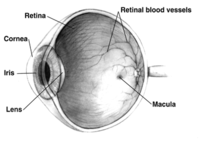
Photo from wikipedia
Vascular endothelial growth factor (VEGF) is an important mediator of the pathological neovascularization and vascular permeability of the eye. The increasing use of intravitreal therapies targeting VEGF has revolutionized the… Click to show full abstract
Vascular endothelial growth factor (VEGF) is an important mediator of the pathological neovascularization and vascular permeability of the eye. The increasing use of intravitreal therapies targeting VEGF has revolutionized the treatment of pediatric vitreoretinal diseases. In retinopathy of prematurity (ROP), the role of VEGF in pathogenesis has been well recognized and the use of anti-VEGF treatment in phase 2 ROP has demonstrated promising results, particularly in severe cases of posterior disease. This has made VEGF an established target in the treatment of pediatric retinal diseases known to have abnormal vascular activity. However, questions remain about late systemic and neurodevelopmental effects after anti-VEGF therapy for children because intravitreal injection of anti-VEGF may result in systemic circulation of anti-VEGF agent and a corresponding suppression of systemic VEGF. We do not currently know whether the short-term suppression of systemic VEGF affects long-term neurodevelopmental outcomes because VEGF is a vital supporting factor during neurodevelopment. This review article focuses on the evidence for the use of anti-VEGF treatment in certain pediatric ocular diseases, including ROP, Coats disease, and retinoblastoma. More extensive and prospective studies are warranted to further elucidate the role of anti-VEGF therapy in these diseases and illustrate how we can optimally use these agents in pediatric patients.
Journal Title: Asia-Pacific journal of ophthalmology
Year Published: 2018
Link to full text (if available)
Share on Social Media: Sign Up to like & get
recommendations!